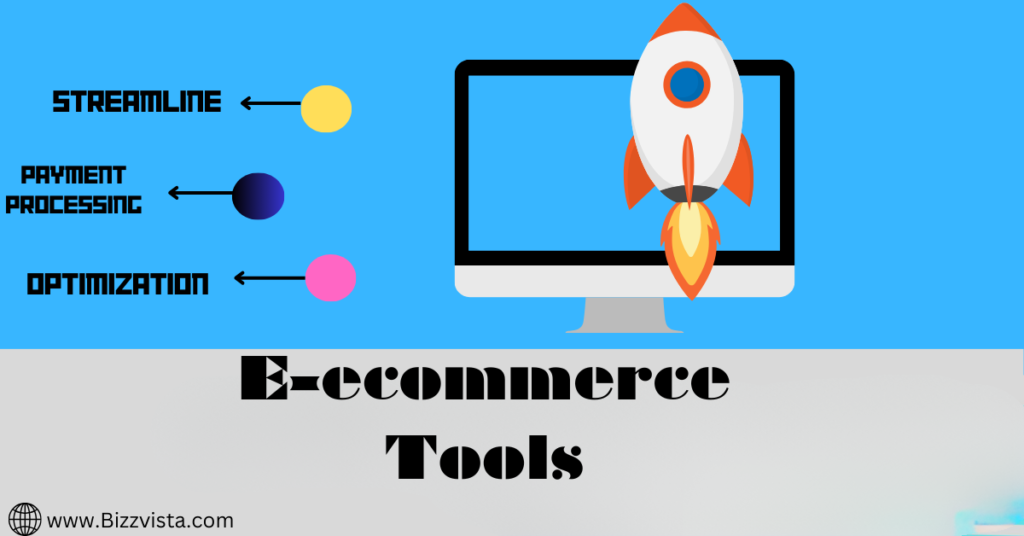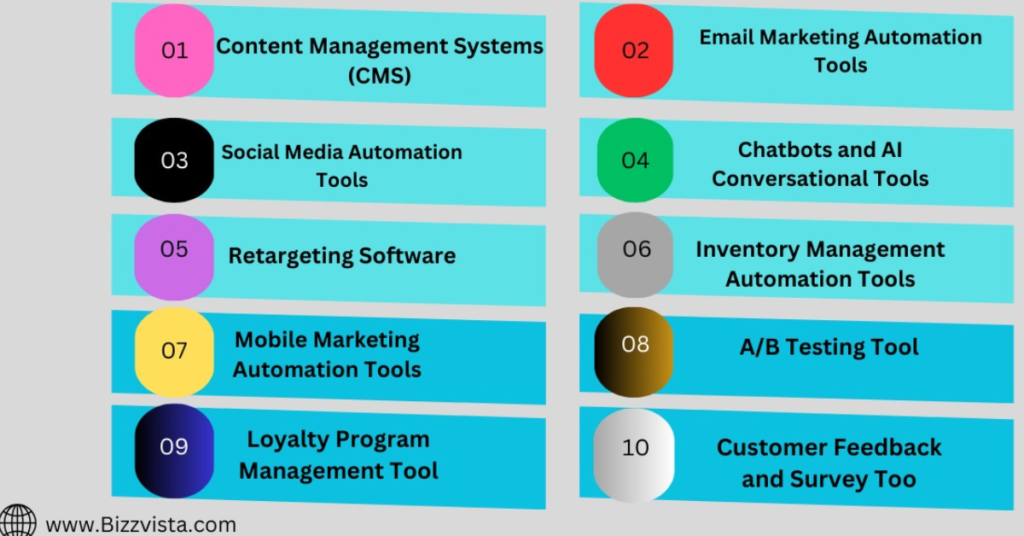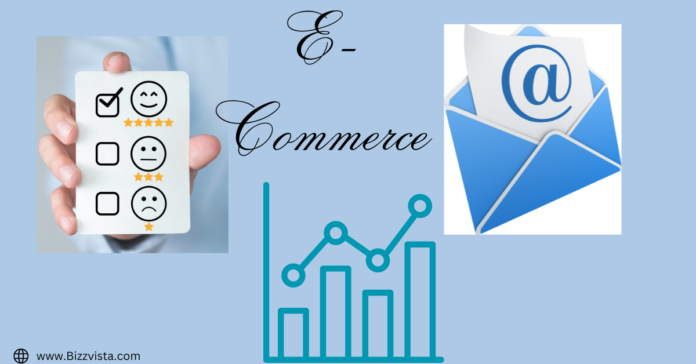E-commerce, the process of buying and selling of goods and services through online means or over the internet, has brought a major paradigm shift in the way businesses operate and consumers shop. Indeed, e-commerce enterprises employ fundamental tools that function as a success powerhouse. The list is long for encompassing e-commerce tools and the range is wide. It includes software, platforms and various other applications that are designed in some way to streamline and optimize multiple aspects of the online e-commerce .These e-commerce tools encompass a wide range of software, platforms, and applications designed to streamline and optimize various aspects of online commerce. Such mechanisms control payment processing, marketing and customer relations management . In this article, various features of e-commerce tools, benefits, and their best practices are under discussion.

The Significance
In the fast evolving digital time, no small or large business can thrive in the online marketplace without staying in touch with e-commerce tools and latest trends. A business whether small or large, needs online presence in modern times. For that, to establish an online brand an experienced professional got much more prominence in recent times. A professional can enhance toolkit, capabilities of e-commerce tools and better understand the nuances crucial for succeeding.
Evolution of E-commerce Tools: Measuring Progress
The inception of e-commerce tools can be likened to the tentative steps of a toddler in the vast playground of the internet. In the nascent stages, businesses relied on rudimentary websites for online transactions. Fast forward to the present, and the evolution has been nothing short of extraordinary. Today’s e-commerce tools range from agile Content Management Systems (CMS) to the intuitive Customer Relationship Management (CRM) software, embodying the dynamic spirit of the digital age.
E-Commerce marketing automation strategies
The eCommerce marketing automation strategies mentioned are just a few examples of the many potential strategies eCommerce marketers can employ.
| Strategy | Description |
| Behavioral Triggers | Set automatic marketing actions based on specific customer behaviors like cart abandonment. |
| Personalization | Use customer data to deliver personalized content and product recommendations. |
| Retargeting Campaigns | Use automated ads to remind and incentivize customers to complete their purchases. |
| Loyalty Programs | Automate rewards for repeat purchases to enhance customer relationships. |
| Social Media Scheduling | Consistently post content across platforms to engage with the audience and maintain brand presence. |
| Email Sequence Optimization | Craft and automate a series of emails that guide customers through a tailored journey. |
| Chatbot Conversations | Deploy AI-powered chatbots to provide instant customer service and support, making shopping easier. |
| Inventory Management Alerts | Set up alerts to monitor stock levels and automate reordering processes to avoid out-of-stock issues. |
| Lead Scoring and Segmentation | Utilize customer data to score leads and segment them for targeted marketing campaigns. |
Leveraging Marketing Automation in eCommerce
Marketing automation is the use of software and technology to automate, streamline, and measure marketing tasks and workflows. In the e-commerce industry, marketing automation is used to:
- Personalize the customer experience
- Improve customer engagement
- Increase conversion rates
- Optimize marketing campaigns
- Streamline operations
Essential Ecommerce Marketing Automation Tools:

Content Management Systems (CMS): Crafting Digital Narratives
A symphony of pixels and code, CMS platforms like WordPress and Shopify have redefined how businesses showcase their offerings. With user-friendly interfaces, these tools provide a canvas for weaving compelling digital narratives, captivating the online audience.
Email Marketing Automation Tools: Klaviyo
Klaviyo shines in the field of email marketing automation tools, giving businesses a robust platform for customizing communication with customers. Hollingsworth specifically highlights Klaviyo’s impressive range of features. These advanced tools facilitate the creation of personalized campaigns that resonate with the target audience, fostering connection and loyalty.
Some of the most popular email marketing automation tools along that include:
- Klaviyo
- Mailchimp
- Constant Contact
Social Media Automation Tools: Kontentino:
Social media presence is a linchpin in contemporary marketing. Kontentino, as recommended by Hollingsworth, streamlines social media management, ensuring cohesive and timely content across platforms.Some of other tools available are:
- Hootsuite
- Buffer
Chatbots and AI Conversational Tools: Tidio
E-commerce’s dynamic nature demands real-time interaction. Tidio, a player in AI conversational tools, offers responsive chatbots, enhancing customer support and engagement. Other tools available:
- ManyChat
- MobileMonkey
Retargeting Software: AdRoll
Retaining customer interest is paramount. AdRoll, a retargeting software, as suggested by Hollingsworth, keeps brands in the forefront of customer minds, boosting conversions. Some of the most popular retargeting software include:
- AdRoll
- Perfect Audience
- Criteo
Inventory Management Automation Tools: QuickBooks Commerce
Smooth operations lie at the heart of successful e-commerce. QuickBooks Commerce, as mentioned by Hollingsworth, automates inventory management, ensuring seamless processes and preventing stockouts. Some of the popularly available tools are also:
- QuickBooks Commerce
- Skubana
- Zoho Inventory
Mobile Marketing Automation Tools: Braze
In a mobile-dominated era, Braze emerges as a potent tool for mobile marketing automation. Hollingsworth’s insights emphasize its role in crafting targeted campaigns and enhancing user experiences.Some of the most popular mobile marketing automation tools include:
- Braze
- Leanplum
- Urban Airship
A/B Testing Tool: Optimizely
The quest for optimal performance drives businesses to A/B testing. Optimizely, highlighted by Hollingsworth, empowers businesses to refine strategies, ensuring continual improvement and adaptability.Some of the most popular A/B testing tools include:
- Optimizely
- VWO
- Google Optimize
Loyalty Program Management Tool: Yotpo
Customer loyalty is the bedrock of sustained success. Yotpo, a loyalty program management tool, fosters brand allegiance, as underscored by Hollingsworth, through tailored rewards and incentives.Some of the most popular loyalty program management tools include:
- Yotpo
- Smile.io
- LoyaltyLion
Customer Feedback and Survey Tool: Qualtrics
Understanding customer sentiments is integral to refinement. Qualtrics, a customer feedback and survey tool, as recommended by Hollingsworth, provides actionable insights, steering businesses towards customer-centric strategies.Some of the most popular customer feedback and survey tools include:
- Qualtrics
- SurveyMonkey
- Typeform
Shipping and Fulfillment Automation: ShipBob
The journey from cart to doorstep demands precision. ShipBob, a shipping and fulfillment automation tool, as noted by Hollingsworth, optimizes logistics, ensuring timely deliveries and customer satisfaction. Some of the most popular shipping and fulfillment automation tools include:
- ShipBob
- ShipStation
- Ordoro



